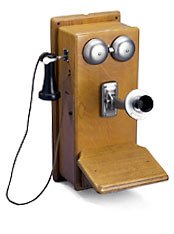Who was the real #inventor of our #telephone?
Origin of Telephone

There have been many lawsuits for a long time about who is the real inventor of the phone.
The Bell Telephone Company, which opened in 1877, had to go through 600 lawsuits in 18 years.
But Bell did not lose a single case. Bell was the first to receive a patent for a telephone in 1876.
It is remembered today as the inventor of the phone and the founder of AT & T, a global telecommunications company.
However, the inventor of the first phone is not a Bell. Opinions differ, but Filip Rice, Antonio Much, and Elisa Gray are more likely to win. It seems clear that Bell is not the first inventor. In 1854, Charles Bourseul, an employee of the telegraph office in France, wrote an article in the magazine(Illustration) about 'Voice transmission through electricity'. He predicted in this article that the day will come when the voice will be carried by electricity. Bourchelle's prophecy was a hit. A telephone was invented.
Seven years later, the German scientist Johann Phillipp Reis (1834-1874) gave a lecture on the subject of "Electrochemistry by the Physics Society". He thought that because the sound was transmitted by the vibration of the air, he could send the voice to the current by changing the vibration of the air to the intensity of the current. Finally, Rice invented the phone in 1861 and called it a "telephone." Two years later, Rice and engineer Wilhelm Albert put phones on the market. However, his inventions were not properly evaluated. In December 2003, BBC News reported that Philip Rice had invented the phone before Bell. 15 years before the bell, Rice invented a "phone" - a device that allows her to communicate at two distant places - in a document archived at the London Science Museum.
- In addition, the Italian American scientist Antonio Meucci (1808-1889) developed an electrically operated telephone system between 1854 and 1860, similar to Philip Rice. In 1860, he talked with his wife who was lying in bed at a factory where he worked, through a telephone. He introduced his invention to the newspaper and issued a temporary patent in 1871. Mitchi lost his phone model and design during his consultations with the Western Union Telegraph Company to patent it, and later patented it with a phone similar to Bell's invented invention. In 1879 Mitch accused Bell of fraud in the court. A tedious court battle continued. In 1889, however, the trial was no longer sustained as the mushroom died in a lonely death. In June 2002, more than 100 years later, the US House of Representatives passed a bill recognizing the merits of muteness. Congress concluded, "If Meucci had only a $ 10 application fee, Bell would not have been granted a patent."
Bell is suspected of copying Elisha Gray (1835-1901), an American inventor who was also a competitor in the phone design as well as the basic design of the phone. On the day that Bell visited the Patent Office, Gray applied for a patent, which unfortunately was recognized as the best expert in the field of telegraphy at the time. Bell and Gray filed a patent application at the same time, but the US Patent Office called the Bell, who patented two hours earlier than Gray on March 7, 1876, to "send electric voices or other sounds over the wire" Issued the patent (No. 174465). Gray was much better because it delivered voice using a metal diaphragm that was much more efficient than the leather membrane used by Bell. Gray has already devised a way to transmit voice using a variable resistor before patenting. Seth Schumann, an American science journalist, wrote in his 2009 book "The telephone gambit, chasing Alexander Graham Bell's Secret," that Bell was not the inventor of the phone and stole the results of other studies . He kept track of the copy of the patent application, the confessions of the patent office administration, the experiment notes of Bell released to the public only in 1999, the growth environment of Bell and the circumstance surrounding Bell at the time of inventing the phone, and questioned the belief that Bell was the father of the phone .